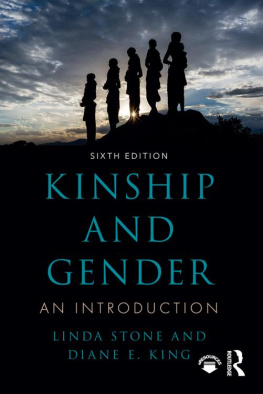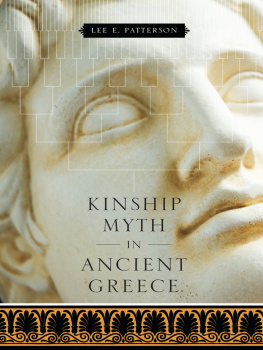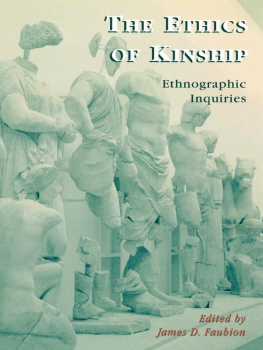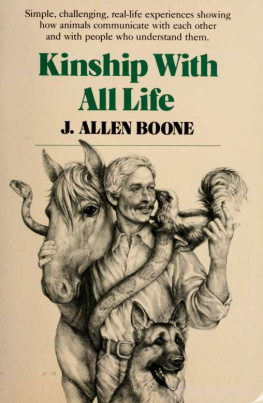Harris - Kinship
Here you can read online Harris - Kinship full text of the book (entire story) in english for free. Download pdf and epub, get meaning, cover and reviews about this ebook. City: Minneapolis, Minn, year: 1990, publisher: University of Minnesota Press, genre: Politics. Description of the work, (preface) as well as reviews are available. Best literature library LitArk.com created for fans of good reading and offers a wide selection of genres:
Romance novel
Science fiction
Adventure
Detective
Science
History
Home and family
Prose
Art
Politics
Computer
Non-fiction
Religion
Business
Children
Humor
Choose a favorite category and find really read worthwhile books. Enjoy immersion in the world of imagination, feel the emotions of the characters or learn something new for yourself, make an fascinating discovery.
- Book:Kinship
- Author:
- Publisher:University of Minnesota Press
- Genre:
- Year:1990
- City:Minneapolis, Minn
- Rating:4 / 5
- Favourites:Add to favourites
- Your mark:
- 80
- 1
- 2
- 3
- 4
- 5
Kinship: summary, description and annotation
We offer to read an annotation, description, summary or preface (depends on what the author of the book "Kinship" wrote himself). If you haven't found the necessary information about the book — write in the comments, we will try to find it.
Harris: author's other books
Who wrote Kinship? Find out the surname, the name of the author of the book and a list of all author's works by series.
Kinship — read online for free the complete book (whole text) full work
Below is the text of the book, divided by pages. System saving the place of the last page read, allows you to conveniently read the book "Kinship" online for free, without having to search again every time where you left off. Put a bookmark, and you can go to the page where you finished reading at any time.
Font size:
Interval:
Bookmark:

Harris, C. C. (Christopher Charles)
This book was produced in EPUB format by the Internet Archive.
The book pages were scanned and converted to EPUB format automatically. This process relies on optical character recognition, and is somewhat susceptible to errors. The book may not offer the correct reading sequence, and there may be weird characters, non-words, and incorrect guesses at structure. Some page numbers and headers or footers may remain from the scanned page. The process which identifies images might have found stray marks on the page which are not actually images from the book. The hidden page numbering which may be available to your ereader corresponds to the numbered pages in the print edition, but is not an exact match; page numbers will increment at the same rate as the corresponding print edition, but we may have started numbering before the print book's visible page numbers. The Internet Archive is working to improve the scanning process and resulting books, but in the meantime, we hope that this book will be useful to you.
The Internet Archive was founded in 1996 to build an Internet library and to promote universal access to all knowledge. The Archive's purposes include offering permanent access for researchers, historians, scholars, people with disabilities, and the general public to historical collections that exist in digital format. The Internet Archive includes texts, audio, moving images, and software as well as archived web pages, and provides specialized services for information access for the blind and other persons with disabilities.
Created with abbyy2epub (v.1.6.7)
Digitized by the Internet Archivein 2018 with funding fromKahle/Austin Foundation
https://archive.org/details/kinship0000harr




Kinship
A *
Concepts in Social Thought
Series Editor: Frank Parkin
Published Titles
DemocracyCitizenshipWelfareFreedomBureaucracyTrotskyismRevolution andCounter-RevolutionSocialismLiberalismThe StateKinshipIdeologyConservatismPropertyStatus
Anthony Arblaster/. AL BarbaletNorman BarryZygmunt BaumanDavid BeethamAlex Callinicos
Peter CalvertBernard CrickJohn Gray
John A. Hall and G. John Ikenberry
C. C. Harris
David McLellan
Robert Nisbet
Alan Ryan
Bryan S. Turner
Preface | |
PART ONE | |
1 Kinship in Structural Anthropology | |
2 The Concept of Kinship | |
PART TWO | |
3 The Character of Kinship | |
PART THREE | |
4 Family and Locality | |
5 Kinship and Economic Life | |
References | |
Name index |



When invited to contribute a volume on kinship to this series, myfirst reaction, as a family sociologist, was to suggest that this volumewould more suitably be undertaken by an anthropologist. Thisresponse is symptomatic of the historical relation between thedisciplines of sociology and anthropology. The study of kinship is ahigh-status activity central to anthropology as a discipline, where itoccupies a place corresponding to the study of stratification insociology. Sociologists do not study kinship, but the family.Whereas family studies have recently acquired a new salience due tothe rise of feminist thought and the interest shown by the new rightin family issues, they remain a relatively unprestigious activitywithin sociology and the effect of their current prominence has beento diminish concern with the family as a kin group and focusattention on gender relations, specifically marital relations, withinthe household.
The reasons for the historical division of labour between the twodisciplines lies in essentially evolutionist assumptions about thenature of our society. Simple7primitive7early societies wereseen to be types of social formation whose structures were based onsystems of kinship in contrast to complex, advanced or modern(i.e. industrial/capitalist) societies whose social life was based onthe structure of economic relations. The study of kinship wascentral to our understanding of the first and of economic life to thesecond.
One of the corollaries of this view is the association of particularinstitutions with evolutionary stages or historical periods and thesupposition that we are situated in the midst of an historical processwhich eliminates some social features and replaces them by others.
This corollary leads us to view kinship in modern societies as anarchaic survival which is doomed to extinction and has only anantiquarian interest. The family, on the other hand, may be seen(at least in its nuclear form) to be universal, and hence worthy ofstudy.
I do not for a moment suggest that anyone, sociologist or socialanthropologist, actually subscribes to these curious doctrines, ornot at least in the vague and imprecise form in which I have statedthem here. My expression of them is designed to indicate, nottheories or propositions which any individual or group actuallyholds, but rather a meaning structure which has formed thebackground to the division of labour between the sister disciplinesof sociology and social anthropology and influences their intellectual practice until the present, in a way which I believe is deleteriousboth to our understanding of kinship and of the nature ofcontemporary society. Because I believe this, I feel it appropriate totackle the subject of kinship in a manner which attempts to breakfree from the meaning frame which has in the past inhibited not onlythe development of our understanding of kinship, but of the natureof human society in general. Because this book is concernedspecifically with kinship - it is not a treatise on social theory - it isappropriate that I set forth, in short order, the alternative presuppositions upon which its writing is based.
A glance at the titles in the series to which this book belongsreveals that the concepts selected for discussion are of two quitedifferent kinds. On the one hand, there are concepts that refer toculturally and historically specific ways of thinking, of which thepolitical concepts are the best examples, i.e. socialism, liberalism,conservatism and democracy. Others refer to universal aspects ofhuman social life (e.g. property and status), although they alsoconnote conceptions of their referents which are culturally andhistorically specific.
In the case of the universal, it is relevant to ask of any givensociety, are there specific and distinct institutions concerned witheach? If there are, it is possible to enquire further as to theautonomy of each institution relative to each of the others and to allthe other institutions co-present with it. It is then possible todistinguish societies in terms of the degree of institutional specialization, and in terms of the type of institution which predominates. Ido not object in principle to this way of proceeding, but it can lead to
Next pageFont size:
Interval:
Bookmark:
Similar books «Kinship»
Look at similar books to Kinship. We have selected literature similar in name and meaning in the hope of providing readers with more options to find new, interesting, not yet read works.
Discussion, reviews of the book Kinship and just readers' own opinions. Leave your comments, write what you think about the work, its meaning or the main characters. Specify what exactly you liked and what you didn't like, and why you think so.















